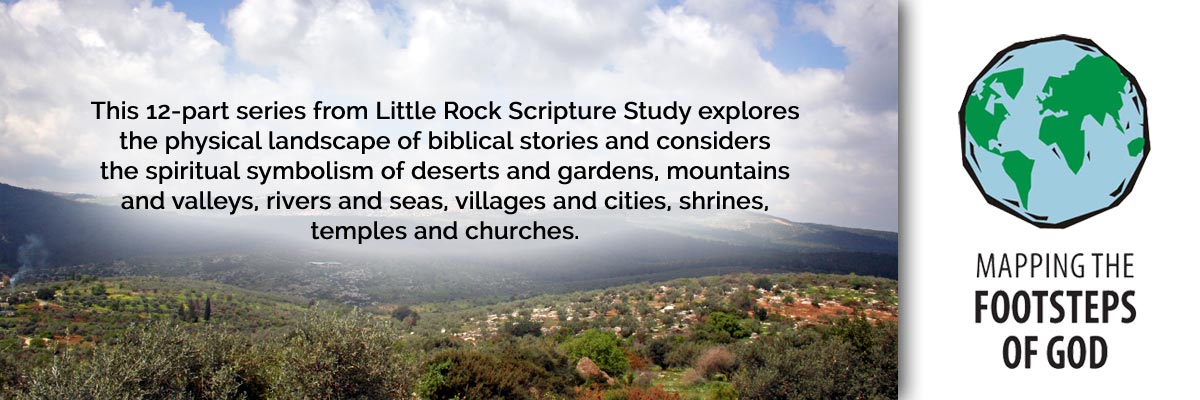Official Website of the
Catholic Diocese of Little Rock
Rivers, streams of Bible flow with new life
Published: June 21, 2014
This is the sixth column in a 12-part series
By Clifford M. Yeary
Associate Director, Little Rock Scripture Study
As scientists search for signs of any kind of life on alien worlds, they usually look first for evidence of water. Life as we know it on earth would not be possible without water. In the Bible, water is closely linked to both physical and spiritual life. The notion of "living water" is of particular importance in sacred Scripture.
 Just as the ability to move under one's own power is often named as a key component of living organisms, so has moving water — especially the water of springs, streams and rivers — lent itself to being called "living water". In Jeremiah, living waters ultimately flow from God: "Two evils my people have done: they have forsaken me, the source of living waters; they have dug themselves cisterns, broken cisterns that cannot hold water" (2:13, see also 17:13).
Just as the ability to move under one's own power is often named as a key component of living organisms, so has moving water — especially the water of springs, streams and rivers — lent itself to being called "living water". In Jeremiah, living waters ultimately flow from God: "Two evils my people have done: they have forsaken me, the source of living waters; they have dug themselves cisterns, broken cisterns that cannot hold water" (2:13, see also 17:13).
In John's Gospel, when Jesus meets a Samaritan woman at a well, he tells her that he can give her living water, water of such a nature that she will never thirst again (4:1-14). Elsewhere in John, Jesus offers those who come to him the gift of the Holy Spirit, which he describes as rivers of living water flowing from those who believe in him (7:38-39).
It is easy to accept moving water as an apt metaphor for the Holy Spirit and the new life we are given in Christ after pondering the importance rivers and streams play throughout the Bible. Indeed, the Bible begins and ends with depictions of streaming water. From the Garden of Eden a spring bubbles up to form the source of four rivers that water the earth, the Pishon, the Gihon, the Tigris and the Euphrates (Genesis 2:6-10).
At the end, a river flows from God's throne in the New Jerusalem, which is the home of all who have been redeemed by the Lamb of God. This river nourishes the trees, the foliage of which becomes the source of healing for all the nations of the world (Revelation 22:1-2).
In Exodus, the life of the infant Moses is ironically spared the death sentence Pharaoh has decreed against all male Hebrew infants (1:15-16) when Pharaoh's own daughter retrieves him from the Nile. Moses had floated downstream toward the palace in a water-worthy basket prepared by his mother (2:1-10). It will be far from the last time in the Bible that someone is carried to new life through the waters of a river.
After the children of Israel pass through the waters of a sea (Exodus 14:10-22) and endure 40 years of testing in the wilderness, Joshua will lead them into the Promised Land by crossing the River Jordan from the east. Just as the waters of the sea divided for Moses and the people as they fled Egypt, the waters of the Jordan separated for Joshua and all Israel as they entered Canaan (Joshua 3:1-17), the land God had promised to Abraham as his inheritance (Genesis13:12, 14-15).
The Jordan is referred to in the New American Bible more than 200 times. Far from the least significant of those references is the account in Second Kings of Naaman, commander of the King of Aram's forces, who had contracted leprosy. Desperate for a cure, he is told by a young female Hebrew slave that there is a prophet in Israel, Elisha, who can bring him healing. When told by Elisha to dip himself seven times in the Jordan he is humiliated. Surely the mightier waters of his land would be more efficacious. But at Elisha's insistence, he submits, and is healed (II Kings 5:1-19a).
There are other important rivers mentioned in the Old Testament; however, some of these are rivers of sorrow. The prophet Ezekiel, in exile with Judah's people in Babylon, has a vision along the banks of the Chebar of God's glory leaving the Temple, surrounded by cherubim, and rolling like a wheel within a wheel in the sky, following the people into exile (Ezekiel 1:1-21).
It is by Babylon's rivers that the exiles from Judah will sing one of their saddest songs, which begins, "By the rivers of Babylon there we sat weeping when we remembered Zion" (Psalm 137:1).
The Jordan, however, will remain the most storied river of the Bible into the New Testament, culminating, for Christians, as the site where John baptized Jesus (Matthew 3:13-17) and from where Jesus' first disciples began to follow him (John 1:35-37). All Catholics are reminded of Jordan's waters in the rite of baptism.
Study Questions
- Recall at least one vivid memory of an event in your life associated with a river, spring or stream. What are some of the feelings you associate with that memory?
- Read the entire account of Naaman's healing in II Kings 5:1-27. What does Naaman ask forgiveness for in advance? Have you ever felt a need to ask for forgiveness in advance of something you knew you were going to do?
- Read Psalm 137. Does the desire for revenge expressed at the end of the psalm cancel any sympathy the rest of the psalm might have aroused in you?
- John the Baptist seems puzzled as to why Jesus would come to him for baptism. (Matthew 4:13-15). How does the Gospel of John explain why it was important for John to baptize Jesus (John 1:29-34)?
This article was originally published in Arkansas Catholic June 21, 2014. Copyright Diocese of Little Rock. All rights reserved. This article may be copied or redistributed with acknowledgement and permission of the publisher.




